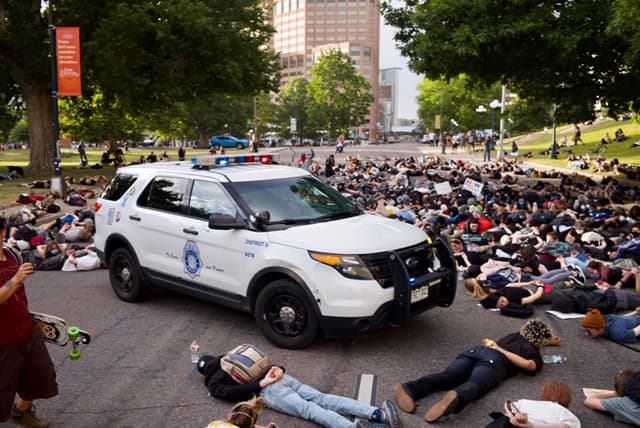Updated on July 17.
Aurora's City Council voted five to four Monday to stop sending officers to Denver if the city puts out a call for additional police assistance from neighboring municipalities. The resolution, brought by Aurora Mayor Mike Coffman, stems from a lawsuit filed in May over responsibility for damages paid to protesters over police misconduct during the 2020 George Floyd protests.
The resolution states that the mutual aid agreement will be suspended "until Aurora receives assurances from Denver that they will be responsible for the defense and damages that arise out of incidents where mutual aid is requested and provided by Aurora."
Coffman said the mutual aid agreement from 2020 meant Denver would foot the bill for any costs incurred. But Denver officials assert that Aurora's interpretation is "overly broad." Coffman called the resolution's ultimatum "leverage" in the ongoing dispute between the two cities.
"We're spending money unnecessarily on litigation," Coffman said before the vote on Monday. "Without this, there is no leverage to get this done."
Coffman said Aurora's officers should be protected when called to Denver, and that Aurora taxpayers would have to foot an "enormous bill" if they have to cover the 2020 costs.
Aurora Councilmember and Mayor Pro Tem Curtis Gardner called the resolution "a big giant middle finger to Denver." He said he worries Denver officers would not want to cooperate with Aurora on smaller crimes across borders. He also suggested Coffman attempt to resolve the dispute with new Denver Mayor Mike Johnston before passing the resolution. While the dispute began under former Denver Mayor Michael Hancock, Johnston was sworn in the same day Aurora City Council passed the resolution. Denverite has reached out to Johnston and the Denver Police Department for comment.
Councilmember Alison Coombs said the resolution was the wrong approach.
"Leadership and collaboration with our neighbors shouldn't be about leverage," Coombs said at the meeting Monday. "It should be about leadership, it should be about communication, and if we feel that we need to exercise leverage over them to come to an agreement, I think the agreement we're going to come to is going to be an impoverished one."
The original story follows below.
A longstanding partnership between Aurora and Denver that stipulates the sharing of police resources between the two cities could come to an end soon.
The Aurora City Council will meet Monday and vote on whether or not to pause the law enforcement agreement.
The action comes a year after Aurora police officers were not included in a settlement during which Denver paid out $14 million in damages to 12 protesters of the 2020 George Floyd protests. The damages were over police response to the rallies, which included their use of tear gas, stun grenades and batons.
The Denver Police Department had requested assistance from surrounding cities, including Aurora, at the time. But the settlement did not cover Aurora's officers. This would mean Aurora would have to foot the bill for any lawsuits against its police.
Aurora Mayor Mike Coffman thought that both entities understood the agreement when officers were deployed to assist with crowd control during the George Floyd protests.
"We deployed our officers under the direction of the Denver Police Department. And so, our understanding was that they would indemnify us and that's not the case right now," Coffman said.
Since then, the City of Aurora has filed a lawsuit over the matter. Outgoing Denver Mayor Michael Hancock respects Coffman's stance, but disagrees with him on the matter.
"We believe Aurora is taking an overly broad interpretation of the indemnity provisions in the mutual aid statute," said City and County of Denver spokesperson Mike Strott in an emailed response. "Our legal teams have been in close contact on this question for months and agreed that asking the court - a neutral party - to decide the scope of indemnification was the best approach."
In another emailed response, Denver police spokesperson Jay Casillia said they are looking into the agreement, but gave no further details.
Incoming Mayor Mike Johnston will be sworn into office on the same day as the Aurora City Council meeting. Coffman said he has spoken with Johnston about the matter and plans to continue the discussion once he's completed staffing his administration.
If the courts rule in Denver's favor, Aurora will terminate the agreement. The city doesn't expect Denver to send its officers into Aurora. Coffman says Aurora will rely on other law enforcement in the surrounding area if it needs assistance.
He believes mutual aid agreements are important and would still like to work with Denver to address crime in the metro area.
"Criminals don't respect the boundaries between the City of Aurora and Denver, and they go back and forth," Coffman said. "We will continue working with the city and county of Denver as well as other jurisdictions to bring down crime in the metropolitan area. That's absolutely in the interest of the residents of the City of Aurora and the Denver metro area."













